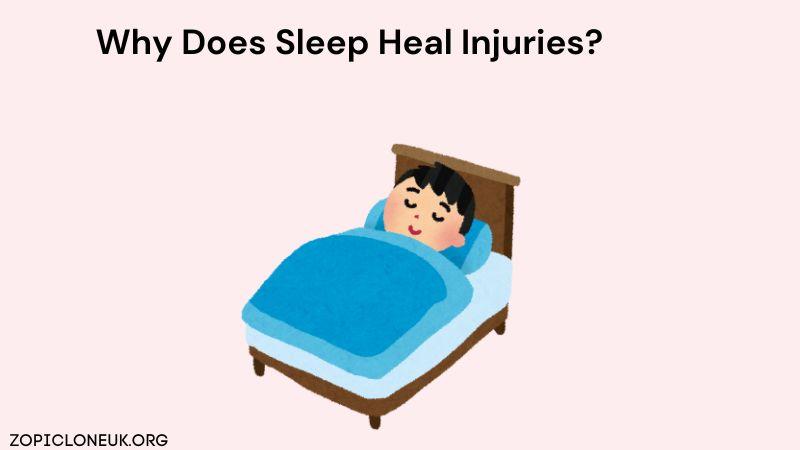
Why Does Sleep Heal Injuries:- Sleep is one of the most powerful yet often overlooked tools for healing injuries. Whether it’s recovering from a broken bone, a sprain, or a muscle tear, sleep plays a critical role in physical recovery. When we sleep, our bodies work to repair damaged tissues, regulate inflammation, and restore energy levels. Understanding the science behind why sleep is essential for healing can us make better choices for injury recovery and overall health.
In this article, we’ll explore the role of sleep in the healing process, how it supports the body in managing injuries, and how you can maximize your sleep quality for optimal recovery.
Contents
Why Sleep Is Essential for Healing
Sleep helps with recovery in a variety of ways:
- Tissue Repair and Growth:
- During sleep, especially during deep sleep stages, the body releases growth hormones that support tissue repair and cell regeneration. These hormones are essential for healing bones, muscles, tendons, and other tissues affected by injury.
- Inflammation Reduction:
- Sleep reduces levels of stress hormones, such as cortisol, which helps to lower inflammation. Chronic inflammation can interfere with the healing process, so getting adequate rest is essential to keep inflammation in check.
- Immune System Support:
- While we sleep, the immune system is more active. It works to fight off infections and support healing at the injury site, speeding up the body’s natural healing processes.
- Pain Management:
- Quality sleep can help reduce pain perception. Deep, restorative sleep increases the body’s tolerance to pain, making the recovery process more manageable.
- Enhanced Blood Flow:
- When we sleep, blood flow to muscles and tissues increases, supplying injured areas with oxygen and nutrients essential for healing.
Read Also:- How Inadequate Sleep Impacts Your Injury Risk
How Lack of Sleep Affects Injury Recovery
Not getting enough sleep can have a significant impact on how quickly and effectively your body heals. Here’s why:
- Slower Recovery: Without sufficient sleep, growth hormone levels are reduced, slowing down the repair of injured tissues.
- Increased Inflammation: Sleep deprivation leads to higher levels of inflammation, which can worsen pain and delay recovery.
- Weakened Immunity: The immune system relies on rest to work effectively. Lack of sleep leaves the body vulnerable to infections, complicating the healing process.
- Higher Pain Sensitivity: Sleep-deprived individuals often experience heightened pain sensitivity, making injuries feel worse than they might with adequate rest.
Tips to Improve Sleep for Faster Healing
Enhancing your sleep quality can significantly improve your body’s ability to heal injuries. Here are some practical steps:
- Establish a Sleep Routine: Going to bed and waking up at the same time daily helps regulate your body’s natural sleep cycle.
- Create a Restful Environment: Keep your bedroom dark, quiet, and cool to promote deep sleep. Use blackout curtains and avoid disruptive noises.
- Limit Screen Time Before Bed: Exposure to blue light from devices can interfere with your body’s natural sleep signals. Aim to turn off screens at least an hour before bed.
- Avoid Stimulants: Caffeine and nicotine can disrupt sleep, so avoid them at least six hours before bedtime.
- Practice Relaxation Techniques: Meditation, deep breathing exercises, and progressive muscle relaxation can help ease tension and prepare the body for sleep.
Extra Tips for Better Sleep
- Invest in Comfortable Bedding: A supportive mattress and comfortable pillows can make a significant difference in sleep quality.
- Stay Hydrated, But Not Right Before Bed: Proper hydration supports recovery, but drinking too much close to bedtime can cause sleep-disrupting bathroom trips.
- Consider Sleep Aids Carefully: Some people turn to sleep aids for extra help. While medications like Zopiclone are available, consult a doctor to discuss if they’re right for you.
Extra Tips for Injury Recovery Through Sleep
- Elevate Injured Areas: Elevation can reduce swelling, making it easier to fall asleep comfortably.
- Avoid Late-Night Heavy Meals: Eating large meals before bed can disrupt sleep, so aim for lighter meals in the evening.
- Incorporate Stretching Exercises: Gentle stretching before bed can alleviate stiffness and improve relaxation, aiding in better sleep.
FAQs
1. How much sleep is ideal for injury recovery?
Research suggests 7-9 hours of sleep per night is optimal for most adults. For those with injuries, even more rest may be beneficial.
2. Is napping helpful for recovery?
Yes, short naps can boost recovery by reducing fatigue and promoting tissue repair. However, avoid naps longer than 30 minutes to prevent disruption to nighttime sleep.
3. What sleep position is best for healing injuries?
Sleep position may vary depending on the injury. For back injuries, lying on the back with a pillow under the knees can provide support. Side sleepers can use a pillow between the knees to keep the spine aligned.
4. Can sleep alone heal an injury without other treatments?
While sleep is crucial, it should be combined with other treatments, like physical therapy or medication, for optimal recovery.
Conclusion
In conclusion, sleep is a cornerstone of the body’s natural healing process. From reducing inflammation to promoting tissue repair, sleep supports every step of injury recovery. Those suffering from an injury should prioritize quality sleep as part of their treatment plan to expedite healing and minimize pain.
For those who find it difficult to fall or stay asleep due to pain, a sleep aid like Zopiclone may offer relief. Zopiclone is a non-benzodiazepine sleep medication that promotes restful sleep, allowing the body to engage in necessary restorative processes during the night. It’s often prescribed for short-term use in those with acute or severe insomnia, particularly when injury-related discomfort interferes with sleep. Doctors may recommend Zopiclone to patients who need support with sleep as part of a comprehensive recovery plan, helping them achieve the deep rest required for healing.
Author Details




Medical content by qualified psychiatrists
Our editorial policy

Zopiclone precautions Read our potential abuse notice

Looking for a seller? Locate the best Zopiclone vendor






